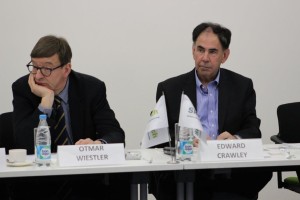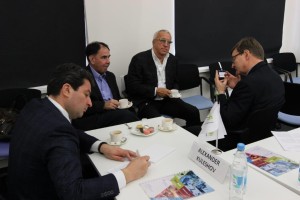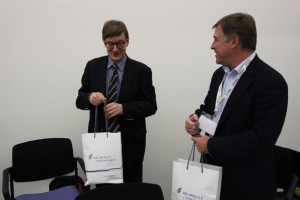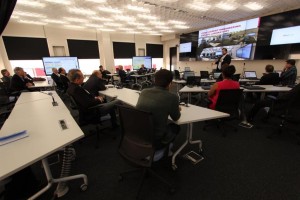
Prof. Dr. Otmar Wiestler, the president of the Helmholtz Association, and Prof. Dr. Edward Crawley, President of Skoltech.

Discussing cooperation. From right to left: Prof. Dr. Otmar Wiestler, the president of the Helmholtz Association, Prof. Dr. Alexander Kuleshov, Skoltech’s next president, Prof. Dr. Edward Crawley, President of Skoltech and Alexei Sitnikov, Vice-President for Institutional Development.
Willkommen is the German word for “welcome”. Skoltech welcomed today a delegation from the Helmholtz Association, Germany’s largest scientific organization, to discuss perspectives of cooperation. The delegation was led by Prof. Dr. Otmar Wiestler, the president of the association, and included Helmholtz centers’ directors, scientists and other distinguished participants.
The guests received an introductory presentation of Skoltech by Prof. Dr. Edward Crawley, President of Skoltech, and an introduction to Skoltech’s Centers for research, education and innovation by Prof. Dr. Keith Stevenson, Provost of Skoltech, and Director of the center for electrochemical energy storage. After that came the counter-presentation of Helmholtz Association, given by Prof. Dr. Wiestler, and Prof. Dr. Günther Wess, Scientific Director of the Helmholtz Centre Munich, German Research Centre for Environmental Health. The presentations were followed by an excursion to the Concurrent Engineering Design Laboratory (CEDL), led by Prof. Alessandro Golkar.
While the excursion took place, the presidents had time to discuss cooperation possibilities between the two organizations, but Prof. Crawley and Prof. Wiestler weren’t sitting alone. They were joined by Prof. Alexander Kuleshov, Skoltech’s next president, and Alexei Sitnikov, Vice-President for Institutional Development. The result of the discussion was a possible cooperation in three areas – computer science, energy and biomedicine.
“This is a very interesting sort of new university here, impressive facilities and an interesting link to MIT, and it would be very interesting to see how this develops further”, said Helmholtz Association’s president, Prof. Dr. Wiestler at the end, “What we would propose to do is to test cooperation between young people, proposing 2-3 areas of research – computer science, energy and biomedical, and what we will try to do is sort of identify young people, maybe 10 junior scientists from both sides, bring them together for a week and then see what they propose. That’s what we just agreed upon. Depending on this we will decide where to go from here, that’s the best way to find out”
From Skoltech’s side, Mr. Sitnikov stated: “We are happy to host the delegation from Helmholtz Association here. We are constantly working on strengthening our cooperation with other significant organizations, and clearly the Helmholtz Association is such. I hope that what we discussed today will lead to commercializing scientific developments and will be beneficial for all—students, professors, and business leaders”.


